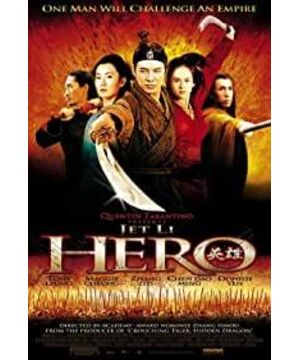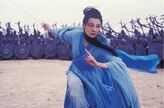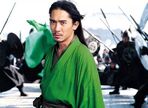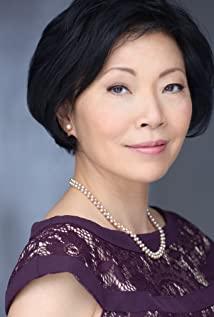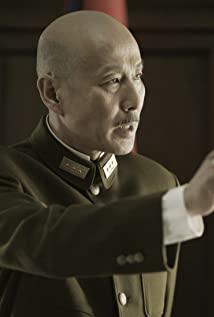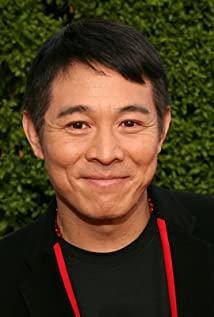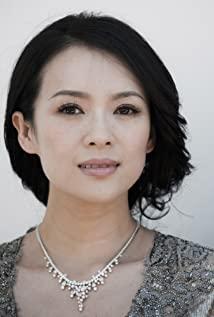"The seven kingdoms have fought for years, and the people have suffered. Only the great king can stop the war and rule the world!" - Wuming
In the past, in the martial arts novels or martial arts movies, except for "The Sword of Yue Girl" by Mr. Jin Yong, there was basically no background in the Warring States period. Because, in the context of the Spring and Autumn Period and the Warring States Period, there were hundreds of schools of thought, flames and flames, people were displaced, and under the shadow of swords, lights, swords and swords, there were often battles between emperors and generals for inch after inch of land. The legend of knights who wandered the world. However, Zhang Yimou still challenged this limit, and used "Hero" to explain to us a legend of martial arts that practiced the righteousness of the world in the face of patriotism!
As Zhang Yimou's first commercial work in the transition from a literary film to a commercial film, "Hero" has been controversial since its release. It has received polarized word of mouth in China, and it can be said that it is constantly topical. Perhaps we have seen too many of Zhang Yimou's literary films, and we cannot accept his commercial transformation, but we cannot use our own subjective emotions to view Director Zhang's development, just like we can't expect him to always shoot "Alive". "And" Qiu Ju's Lawsuit", "Hero" is a necessary part of his directing history. And whether it is the director's growth history of director Zhang, or the analysis of our country's film development level, "Hero" is a milestone film in the development history of my country's film industry. Film language analysis film scholar Andre Bazin once said: "To better understand the tendency of a film, it is best to first understand how the film expresses its tendency." If you analyze the audio-visual language of "Hero", It is very rich. The editing of the film is concise and fast, leaving almost no rigid connections. In the fighting scenes in the film, multiple groups of long shots are used intensively, and fast and sharp movements are used to highlight the intensity of the confrontation. In the use of sceneries, the medium and close-up scenes are sometimes used to create an immersive feeling, bringing the audience closer to the martial arts sword fight of the knights, experiencing the joy and pride in their duel, and drawing closer to the characters. distance;
From time to time, the viewer is kept out of the way, using the perspective of God to pull the viewer away to have a bird's-eye view of the entire environment, the magnificent expanse of the northwest desert, and the magnificent momentum of the Qin army. ...
As a benchmark film for cultural export to the Western world, of course, elements containing Chinese culture are added to various plots. The location of the duel between Wuming and Changkong is a chess hall similar to an inn, which incorporates the style of traditional Chinese martial arts. The background rhythm of the duel and the beating of the bells and drums during the duel show the cultural heritage of the film. The calligraphy of Zhao State Library, stroke by stroke, adheres to the integrity of the people of Zhao State. There are also many martial arts fights in the film, which also let the audience understand the charm of martial arts culture. Leave a little time in the unnecessary fights. For example, there are two nearly repeated martial arts scenes in the film (Anonymous vs. Flying Snow), both of which only give less than 10 seconds of space. It can be seen that even the culture and martial arts, which are regarded as highlights, have the same function as audio-visual language, and they still serve the story.
From the point of view of narrative technique, the repetitive linear narrative technique (movie narrative technique) is adopted, and the time point when the audience will meet Wuming and Canjian Feixue for the first time is combined with imagination to present a different story and promote the evolution of the plot. . He has well adhered to the layers of ancient Chinese culture, one layer at a time, and also includes realms, each of which is a new realm. The story of "Hero" cleverly connects these layers of stories, and portrays the characters of the four protagonists incisively and delicately. Maggie Cheung's Feixue is trapped by love and hatred, Chen Daoming's Qin Wang is arrogant, but he also knows humility, loneliness and awakening. Jet Li's nameless face is paralyzed from the beginning to the end of the film. Changing color, not only forbearance and restraint, but also resourceful, and finally chose to sacrifice his life for the world. But the most deeply portrayed role in the film is undoubtedly the broken sword played by actor Tony Leung.
There is a very important clue in the film, which is Can Jiancong's "Wu Jian" in calligraphy. It is rumored in the world that he realized a set of swordsmanship from calligraphy, but how can the highest level of swordsmanship be explained by mere moves? Can Jian is the first person in the film to realize swordsmanship to the highest level, and Qin Wang is the last one. But from King Qin's mouth, we learned that the highest state of this swordsmanship is "without a sword in the hand, and without a sword in the heart, with a big mind and tolerance for everything, that is not killing, it is peace." From the very beginning, he chose to let the King of Qin go. Why? The King of Qin has the ability to unify all countries. If the world is unified, there will still be wars and chaos, and will the people live in peace?
He is just an assassin, but he is in the same group as King Qin's idea, that is, the unification of the world. It is no wonder that King Qin sighs that the person who knows him best is actually an "assassin". With this idea in mind, Can Jian chose to protect Qin. Even if he is a Zhao person, even if his wife turns against him, he is still on this tangled balance, tilting to "the world".
He looked forward to the peaceful day when he and Feixue could stay away from the world and reach the place where "there is no sword, no swordsman, only one man and one woman". In the end, in the duel with Feixue, he chose to die, and finally made his wife understand the sentence - "I have the world in my heart, and you."
The voices of public opinion against "Hero" are nothing more than fictional stories and propaganda of Qin Shihuang's dictatorship. It is common to choose the Warring States period to make up a history of martial arts, but it cannot stand scrutiny because it is unacceptable. The reason why the director gave King Qin a positive side is because people cannot deny the contribution that King Qin made in unifying the six kingdoms in history. And most importantly, the theme of the "view of the world" that runs through the film is the fact that the director really wants to express, not the propaganda of autocracy as netizens call it. There are indeed flaws in "Hero". For example, Donnie Yen's Zhang Kong left the scene early and became a name in the character's mouth. The acting space of King Qin was too narrow, and the picture processing was too gorgeous...
However, in domestic films, for a film that can achieve perfection in narrative, audio-visual, theme, and performance, despite its flaws, it is overkill to blindly oppose it! In the subtitles at the end, King Qin ruled China and started the feudal monarchy that lasted for more than 2,000 years. Returning to the movie title "Hero", who is the "Hero"?
He chose to give up the assassination of Qin, and was a hero who had the righteousness in mind against his wife. In the end, he did not actually assassinate the King of Qin, and he persuaded the King of Qin to remember the "highest realm of swordsmanship" and died for Wuming. Hero; King Qin, who reluctantly killed Wuming and buried him, finally unified the Central Plains and practiced his own view of the world, was actually a hero. Therefore, those who can truly realize the realm of "the world" and practice the world view are true "heroes".
The world under the feet of all beings seems to be the same, but there are also differences, that is, the "heroes" who bring peace to the world behind their backs.
View more about Hero reviews


